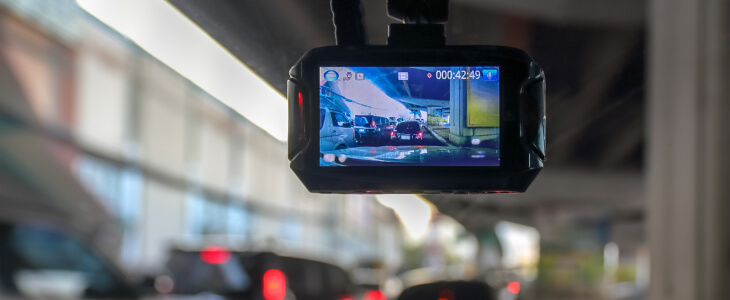In Philadelphia and throughout the country, the advent of dash cams (dashboard cameras) has revolutionized how car accidents are documented, analyzed, and litigated. Cooper Schall & Levy, a leading personal injury law firm in Philadelphia, is well aware of the significant role dash cams can play in car accident lawsuits. If you have suffered a serious injury in a traffic collision, contact our offices to discuss your options with a knowledgeable professional.
What Is a Dash Cam?
A dash cam is a small, onboard camera mounted inside a vehicle, typically on the dashboard or windshield, designed to record the driver’s view in a continuous loop. It captures video and audio footage while the car is in motion and, in some cases, even when it’s parked. Dash cams have gained popularity for their ability to provide real-time, objective evidence of road incidents, providing a clear picture of the events leading up to, during, and after a car accident.
What Can a Dash Cam Help To Prove?
Dash cams can be pivotal in personal injury lawsuits stemming from car accidents, serving several critical functions:
- Determining fault and liability by providing undeniable evidence.
- Recording traffic law violations, road conditions, and traffic signals.
- Showing severity of impact in terms of vehicle damage and personal injuries.
- Contradicting false or exaggerated claims from other parties involved in the accident.
Benefits of Owning a Dash Cam Go Beyond Its Role in Accident Reconstruction
Having a dash cam in your car also provides:
- Objective evidence for insurance claims, potentially speeding up the claims process.
- Protection against staged accidents designed to extort money from innocent drivers.
- Precise information in the face of hit-and-run accidents.
Potential Disadvantages of Owning a Dash Cam
While the advantages of having a dash cam on your car if you are involved in an accident are many, there are also potential drawbacks for drivers to consider:
- Privacy concerns
- The need to manage and securely store footage, which may require regular attention to ensure the device is recording as intended.
- Legal restrictions on the use of dash cams in some jurisdictions.
- Irrefutable evidence of your liability if you are at fault.
PA Dash Cams Laws
In Pennsylvania, the use of dash cams is generally permitted, but it’s essential for drivers to adhere to the specific legal guidelines below to ensure that their footage is admissible in court and does not violate state laws:
Windshield Placement — Cameras should not obstruct the driver’s view, so they must not be mounted on your drivers’ windows or windshields. Instead, dash cams in Pennsylvania must be true to their name and only be installed on your dashboard to meet to state regulations and avoid penalties. Also, dash cams screens in the state must not distract drivers, so to be legal, they must either not have screens or have screens that can be put to sleep.
Audio Recording — In Pennsylvania, consent of all parties is required for audio recording to take place. Therefore, drivers should be cautious when recording conversations. If your dash cam records audio, you must get consent from everyone in the vehicle (including employees and customers) before recording their voices.
The Takeaway
Dash cam evidence can significantly influence the outcome of a personal injury lawsuit, providing as it does an undeniable record of events in a split-second, stressful situation. Nonetheless, it must be remembered that, like other technological advances, dash cams must be used carefully to align with state laws and respect the privacy of all parties. At Cooper Schall & Levy, our attorneys are dedicated to using dash cam footage, like all other evidentiary tools at our disposal, to build the strongest possible case for our deserving clients.


